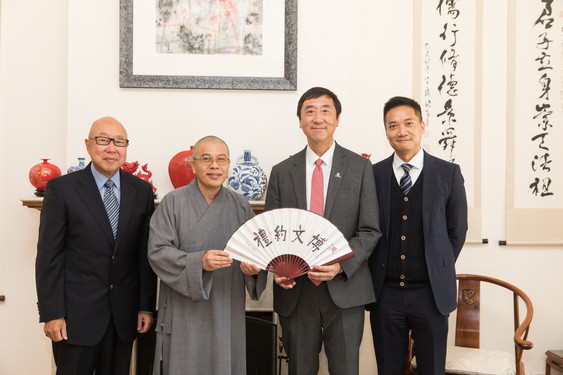News
Tsz Shan Monastery Supports CUHK Study on “Loving-kindness and Compassion Meditation: Exploring and Evaluating its Effectiveness on Improving Psychological Well-being among Stressed Professionals in Hong Kong”
4 JAN 2018
The Chinese University of Hong Kong (CUHK) is honoured to receive a generous donation of HK$1 million from the Tsz Shan Monastery in support of the study entitled “Loving-kindness and Compassion Meditation: Exploring and Evaluating its Effectiveness on Improving Psychological Well-being among Stressed Professionals in Hong Kong” undertaken by Prof. Samuel Y.S. Wong of Jockey Club School of Public Health and Primary Care of CUHK. A donation ceremony was held on 29 December 2017, officiated by Venerable Thong Hong, Abbot of Tsz Shan Monastery and Professor Joseph Sung, the then Vice-Chancellor and President of CUHK. Mr Walter Ngai, Secretary General of Tsz Shan Monastery, and distinguished guests from the Tsz Shan Monastery, also joined the ceremony. Professor Samuel Y.S. Wong, Head of Division of Family Medicine and Primary Health Care, Jockey Club of Public Health and Primary Care of CUHK, introduced to the guests details of the research project.
There are only limited studies conducted on the use of loving-kindness and compassion meditation in improving psychological well-being and improving anger control. The study is proposed to evaluate the use of a loving-kindness and compassion meditation protocol devised by expert meditators in its use to improve psychological well-being, improving anger control and reducing psychological stress, anxiety and depressive symptoms among stressed professionals in Hong Kong. This study will include both a small pilot, focusing on feasibility and acceptability of participants followed by a larger randomized controlled study.
Professor Joseph Sung said in his welcoming address, 'I would like to express my heartfelt gratitude to Venerable Thong Hong and the Tsz Shan Monastery for their generosity in support of our research projects. As you all may aware, the stress level of many Hong Kong people is often very high. Findings of surveys and studies reflect that many Hong Kong citizens, from children, teenagers, adults to elderly, are living under immense pressure. As revealed by the Centre for Health Protection of the Department of Health of the HKSAR Government on "World Health Day 2017", 3 out of every 100 Hong Kong citizens aged between 16 and 75 were found suffering from depression, and about 55 percent of these sufferers never sought help from any mental health services.'
In his speech, Venerable Thong Hong highlighted the importance of improving the psychological well-being, especially the highly stressed professionals in Hong Kong. 'We want to find evidence to confirm whether the stressed professionals will be able to develop a peaceful mind through practicing loving-kindness and compassion meditation,' he said.
About Tsz Shan Monastery
Tsz Shan Monastery is a Chinese Buddhist monastery established for the preservation of the inheritance of the Dharma preached by Śākyamuni Buddha. The idea for the development of Tsz Shan Monastery germinated with Mr. Li, who has made grants of over HK$2.6 billion from his personal foundation to cover the full cost of construction and the daily operating expenses of the Monastery.








